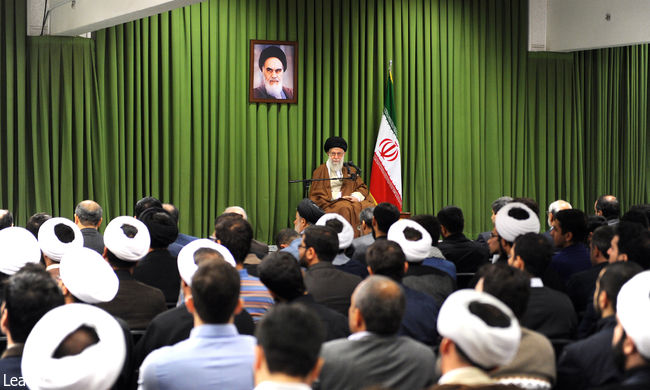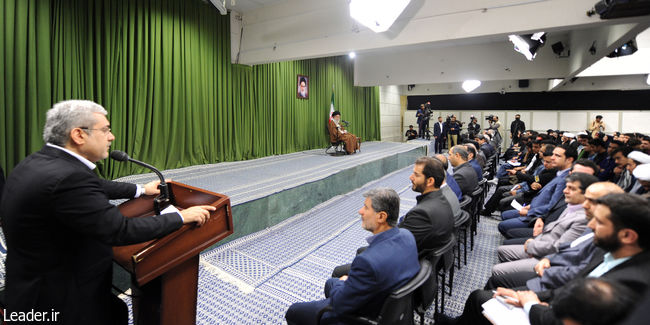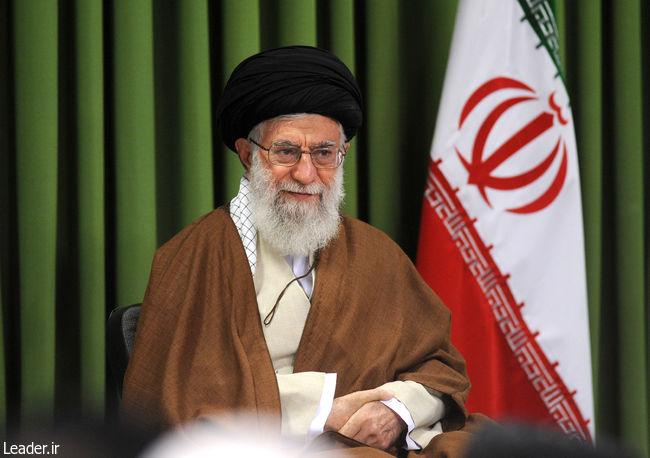In a meeting with hundreds of young elites and outstanding scientific talents, Leader of the Islamic Revolution Ayatollah Seyyed Ali Khamenei described the young elites of the country as a source of hope for the brilliant future of Iran, and pointed to the need for vigilance in the face of the deceit and chicanery of the Great Satan (the US). Addressing the people, officials and political and media activists, the Leader underscored seven important points about the recent issues regarding the 2015 nuclear deal known as the Joint Comprehensive Plan of Action (JCPOA).
Ayatollah Khamenei described political dependence as very dangerous and grounds for knocking nations around and pointed to the complete removal of Iran’s dependence on the US.
“Having monitored the developments in, and actions of the Islamic Republic of Iran, enemies are strongly concerned and furious about the transformation of Iran from a backward and dependent country to an effective and influential country that enjoys ever-increasing political, defensive and scientific prowess.”
The Leader recalled the animosity of the US regime toward the Iranian nation from the early days of the Revolution and added, “In those days, there was neither the nuclear nor the missile and regional influence issue; however, the Americans had learnt that with the victory of the Revolution, they had lost Iran as a subordinate, obedient and very beneficial country.”
Ayatollah Khamenei described Iran’s transformation into a role model in the minds of nations as a reason for the greater fury and hopelessness of hegemonic powers and added, “Over the past 40 years, the Iranian nation has proven to the world that it is possible not to fear superpowers, stand up to them and in spite of sanctions and pressure, attain ever-increasing growth and progress.”
He said Iran’s progress in the military and missile domains amid full-scale sanctions has drawn the astonishment and even admiration of some of the spiteful enemies and added, “An article by a Zionist general a few years ago in this regard bears witness to this reality.”
The Leader said he did not want to waste the time of a good and useful session with young elites by responding to the US president,’ Ayatollah Khamenei added, “Notwithstanding, we should all pay attention to an important issue, namely, the necessity of getting to know the enemy because any nation which does not identify its enemy and considers it as a friend or impartial will certainly be subjected to threats and exposed to danger.”
He added, “In Nahj al-Balagha, Imam Ali says ‘I won’t fall asleep and I know what is going on around me’ and the Iranian nation and officials must also not be affected by sleep and negligence, because in such a case they will launch a camisado on us and we will be plundered.”
Pointing to the proper and correct responses of the country’s officials to Trump’s gibberish, the Leader of the Islamic Revolution said the US president and rulers as suffering from ‘retardation’ because they do not understand the developments in Iran and the region.
“They want to take back young, faithful and developed Iran to 50 years ago and, of course, this is not possible, but due to backwardness, they are incapable of understanding this reality and for this reason, they have made a miscalculation, and suffered and will suffer successive defeats at the hands of the Iranian nation.”
The Leader of the Revolution described the very vile US regime as ‘The Great Satan’ and ‘The Greatest Evil’ as per the truly correct words of the late founder of the Islamic Republic, Imam Khomeini, reiterating, “The US establishment is the agent of the dangerous and malicious international Zionism, the enemy of dependent nations and the cause of most wars in the region and the world and like a leech seeks to suck whatever the nations have.”
He pointed to Trump’s remarks in the election campaign that Daesh had been created by the US, adding, “It is natural that US leaders would yell and speak against the Islamic Revolution Guards Corps that has dealt a blow to the dangerous objectives of the US and Daesh in the region.”
Ayatollah Khamenei described the thwarting of US plots in the region, such as in Syria, Lebanon and Iraq, as another reason for the rage and wrath of US officials and added, “The Islamic Republic has foiled the malicious US plots.”
After elucidating the reasons for the ire and disappointment of the Americans, the Leader of the Islamic Revolution stated seven important recommendations to the people, officials and political and media activists regarding the recent issues.
For the first point, Ayatollah Khamenei stated, “Everyone should know that this time, too, the US will definitely be dealt a slap in the face and defeated by the revolutionary Iranian nation.”
The second recommendation of the Leader of the Revolution was to avoid negligence in the face of the US deceit and duplicity.
He reiterated, “The US president showing stupidity should not lead us to neglect the conspiracies and duplicity of the enemy and regard it as trivial; in fact, we should all be present on the scene with prudence, vigilance and complete readiness.”
Ayatollah Khamenei added, “Of course, a military confrontation will not occur, but there are issues which are no less important than war; therefore, we have to anticipate them and be careful.”
As part of the third recommendation, the Leader of the Revolution pointed to the US hostility against the elements of Iran’s power and reiterated, “Contrary [to the will] of the enemy, we should all reinforce these elements.”
He described the defence sciences and power as among the Iranian nation’s main constituents of power and added, “The missile prowess should increase every day to the chagrin of the enemy.”
Ayatollah Khamenei described the economy as among the other elements of Iran’s might and reiterated, “Serious attention must be paid to the reduction of dependence and increase of the endogenous power of the economy.”
On the same note, the Leader said, “We have repeatedly stated that we have no problems with investment by foreigners, including Westerners, but the economy of the country should not be dependent on a pillar that shakes with the roar of someone like Trump.”
He added, “Iran’s economy should rest on the pillar of domestic capability and potential, and the declared policies of resistance economy should be followed upon and implemented.”
“Ignoring the impression created by the enemy” was the fourth key recommendation of the Leader of the Revolution regarding the recent developments.
Ayatollah Khamenei said, “On the JCPOA, the enemy tried to create the impression that if an agreement is reached all of the hostilities would be removed; we struck a deal, but the enmities grew.”
He reiterated, “There should be no statements today, either, that if we do not make a deal on such and such an issue, such and such will happen. This is part of the impression the enemy is trying to make, and we ourselves should find out what’s good for us, and not hear it from the enemy.”
The fifth recommendation of the Leader of the Islamic Revolution, namely increasing the defensive might, stemmed from the experience of the 1980s Sacred Defence War.
He reiterated, “In those years, Tehran was defenceless under the bombardment of Saddam [Hussein] and his Western supporters, [and] the country’s youth started from scratch and gradually reached such a capability that [caused] the enemy to stop when it witnessed our ability to respond in kind.”
Ayatollah Khamenei reiterated, “We should also increase our defensive might now, so that enemies won’tbecome impudent and bold, and won’t be encouraged to launch an attack and put a foot wrong.”
In his next recommendation, the Leader of the Revolution highlighted the issue of the Europeans’ approach to the recent issue.
He said, “Understanding that the JCPOA is in the interests of themselves and the Americans, the Europeans expressed opposition to the remarks of the US president about tearing up the JCPOA, and the adoption of this stance is good but not enough.”
The Leader of the Revolution said, “So long as the other side has not torn up the JCPOA, we will not tear it up either; however, if they tear up the JCPOA, we will shred it.”
The Leader of the Islamic Revolution reiterated, “The Europeans must stand up to US measures such as the violation of the JCPOA, including the sanctions that they expect Congress to approve, and refrain from unanimity with the Americans on issues such as Iran’s defensive power and the presence of Iran in the region because we will, by no means, accept the Europeans getting on board with the US.”
On the same note, the Leader added, “Those who have atomic missiles and weapons are prohibiting Iran from possessing missiles with ranges of two or three thousand kilometers. This issue and other matters related to Iran are none of your business.”
The final recommendation of the Leader of the Revolution was to take the Resistance Economy and its principles seriously, including domestic production, prohibition of unnecessary imports, prevention of smuggling of goods and the creation of jobs.
He reiterated, “The year is more than half way through, and efforts should be redoubledto achieve objectives and make up for the shortcomings stemming from electoral statements, so that Iran’s economy will transform from an oil-driven one an economy based on added value.”
In another part of his speech, the Leader of the Islamic Revolution described the meeting with the young elites as a sweet and favorable session that is replete with hope for the future and horizons ahead and stressed that elites are divine blessings and gratitude must be extended for this blessing, saying, “I deeply and strongly believe in elites and officials must also realize that we have elites and these elites can change the destiny of the country.”
He described scientific progress as paving the ground for the might of the country and reiterated, “Despite its resplendent background in the field of science, our country fell behind in the science race during the reign of foreigners and this deficit must be offset.”
The Leader of the Islamic Revolution described the elimination of dependence as the main path to prevent the country’s Westernization and stressed that scientific progress is among the main elements to break free of dependence, reiterating, “No obstacle should be created in the path of scientific and technological progress by various apparatuses.”
Citing the exceptional capacities of the country, Ayatollah Khamenei said the ground is prepared for the country for scientific and technological progress, and expressed pleasure with the measures of Iran’s National Elites Foundation and the Science Department of the Presidential Office, adding, “Of course, we should not be content with this extent of progress because we have a long way to go to reach the satisfactory point.”
Continuing, the Leader of the Islamic Revolution pointed to a fundamental point and said, “Trends and currents should be set in scientific progress, so that management styles and methods in various administrations will not have an impact [on progress] and the scientific progress of the country will not stop.”
Ayatollah Khamenei also stated some points regarding issues related to science and technology.
“Increasing the quality of the regulations of knowledge-based companies,” “the need to increase the budget for science and technology,” “proper management of financial resources in this sector,” and “the need to promote the quality of scientific papers” were points which the Leader of the Islamic Revolution highlighted.
He strongly urged the Science Department of the Presidential Office and the Elites Foundation to utilize the capacities of government apparatuses more than ever.
The Leader of the Islamic Revolution also said, “A fundamental solution must be worked out for the country’s industry, because the industry is afflicted with the plight of montaging and as long as this plight exists, innovation will not be the focus of attention, and mobility and scientific work will also stop, and in such conditions no link would be established between universities and industry.”
He pointed to the need to attach importance to cultural activities in the Scientific Department of the Presidential Office and the National Elites Foundation and added, “More dangerous and bitter than the assassinations in the past few years in which a number of our scientists were martyred is the intellectual and cultural captivity of scientists; therefore, the elites must take care of themselves with piety.”
In the final part of his remarks, the Leader of the Revolution described the conditions today and the stance of the country as the best opportunity for the youth to boost their faith, making scientific efforts for progress and the removal of problems, saying, “I am certain that you youth will have an Iran facing you that is much better, more advanced and more organized.”
At the beginning of this meeting, Dr. Sattari, the vice-president for scientific and technological affairs and the head of the National Elites Foundation, pointed to the need for a change in economic approach from an oil-based economy to an economy based on creative, faithful and self-confident human resources and said, “Designing a successful educational paradigm, concentration on boosting the capabilities of the elites and the attraction of Iranians abroad and the creation of elite network is among the most important activities and approaches of the National Elites Foundation.”
At the beginning of this meeting, six elites expressed their concerns and their suggestions.
Gentlemen:
Mohammad Salari Nasab - mechatronics engineer and a prize-winner in the 1390 Kharazmi Festival
Mohammad Amin Sadeghi – Ph.D. in computer sciences and bronze medal winner in World Computer Olympiad
Mohammd Hagh Shenas – Ph.D. candidate in management and ranking first in the matriculation exam
Seyyed Reza Kazemi – M.A. in philosophy of science and the CEO of knowledge-based company
Isa Zare’pour – Ph.D. in computer engineering
And ladies Fateme Khoshnevisan – Ph. D. candidate in management and the winner of the National Elites Foundation prize
Underlined the following issues:
The need to create a calm atmosphere devoid of tensions in scientific and educational centers
The need to deploy elites in industry and decision-making apparatuses
The need for change in the approach of universities toward applied and local research
The need to counter imports in cyberspace through the production of domestic and clean content
The need to reform the laws of knowledge-based companies and moderns professions



